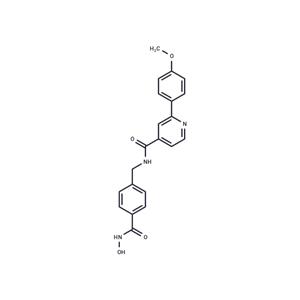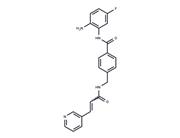| Name | HDAC-IN-57 |
| Description | HDAC-IN-57 is an orally active pan-inhibitor of histone deacetylase (HDAC), inhibiting HDAC1, HDAC2, HDAC6, and HDAC8 with IC50 values of 2.07 nM, 4.71 nM, 2.4 nM, and 107 nM, respectively. HDAC-IN-57 inhibits LSD1 with an IC50 value of 1.34 μΜ. HDAC-IN-57 has anti-tumor activity and can induce apoptosis. |
| In vitro | HDAC-IN-57 (Compound 5e) (1.0 μM, 2.5 μM, 5.0 μM; 48 h) effectively suppresses the migration and invasion of solid tumor cell lines, namely MGC-803, A549, and HCT-116. Furthermore, HDAC-IN-57 demonstrates significant growth inhibition in these solid tumor cell lines, exhibiting IC50 values of 0.45 μM, 1.48 μM, and 0.57 μM, respectively. Additionally, HDAC-IN-57 elicits apoptosis in MGC-803 and HCT-116 cells in a dose-dependent manner. It also exerts inhibitory effects on LSD1 and HDACs within the MGC-803 and HCT-116 cell lines. Moreover, HDAC-IN-57 induces cell cycle arrest in the G2/M phase for both MGC-803 and HCT-116 cells.[1]
HDAC-IN-57 has high metabolic stability in vitro. Retains 86.1% and 87.4% of the parent compound after 1 hour of incubation in human liver (HLM) and rat liver microsomes (RLM), respectively, with a T1/2 of over 120 minutes.[1] |
| In vivo | HDAC-IN-57 (Compound 5e) (1 mg/kg, i.v.; 10 mg/kg, p.o.) demonstrated T1/2 of 0.37 hours (IV) and 2.75 hours (OR), with an oral bioavailability (F%) of 10.6%.[1]
HDAC-IN-57 (25 or 50 mg/kg gavage; once daily for 21 days) achieved dose-dependent tumor growth inhibition in the NOD-SCID mouse MGC-803 xenograft model.[1] |
| Storage | Shipping with blue ice. |
| Solubility Information | DMSO : 45 mg/mL (119.24 mM)
|
| Keywords | HDACIN57 | HDAC-IN-57 |
| Inhibitors Related | Stavudine | 5-Fluorouracil | Acetylcysteine | Kaempferol | Myricetin | Sodium 4-phenylbutyrate | L-Ascorbic acid | Dextran sulfate sodium salt (MW 4500-5500) | Metronidazole | Sorafenib | Tributyrin | Curcumin |
| Related Compound Libraries | Bioactive Compound Library | Inhibitor Library | Anti-Aging Compound Library | Bioactive Compounds Library Max | Anti-Cancer Compound Library | Anti-Cancer Active Compound Library |

 United States
United States



